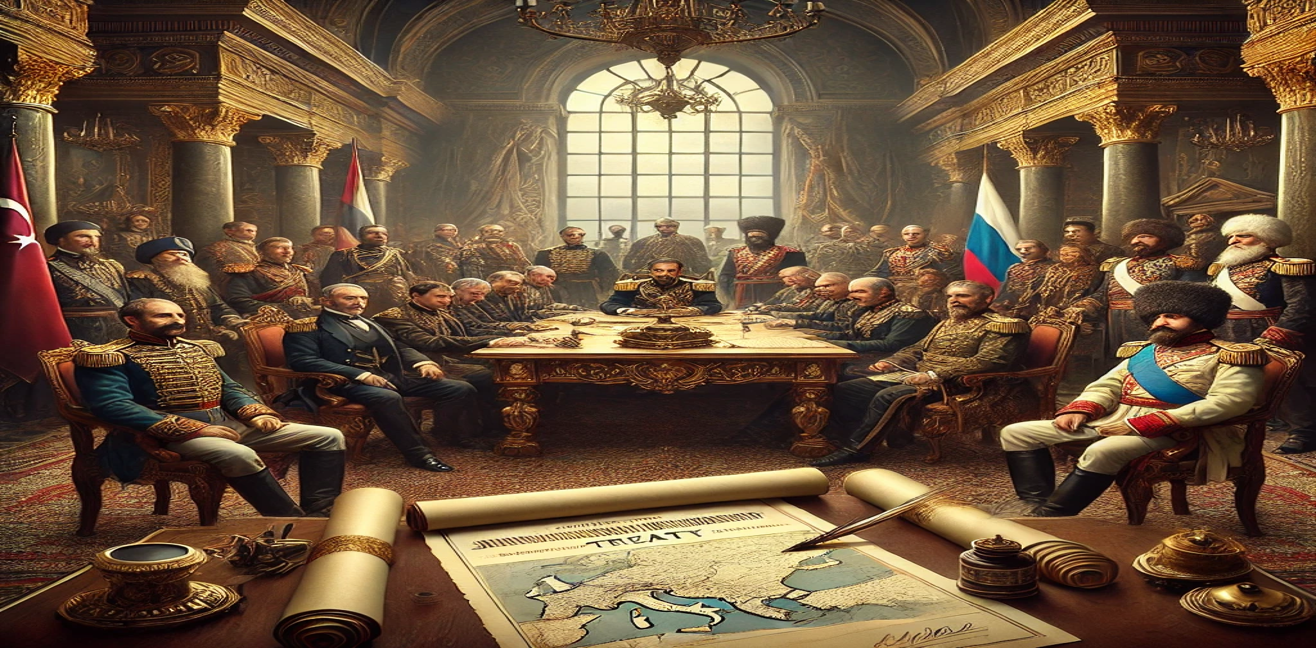At the beginning of the 19th century, the relationships between the Ottoman Empire and the Russian Empire were among the most important elements of the political landscape and power struggles in Europe. One of the significant turning points in this ongoing battle was the Treaty of Bucharest, signed in 1812. This treaty not only influenced the relations between the Ottoman Empire and Russia, but it also had a profound impact on the political dynamics of the Balkans and the surrounding areas of the Black Sea.
The Background of the 1812 Treaty of Bucharest
The Treaty of Bucharest marked the end of the Russo-Turkish War (1806-1812). This war had been a part of Russia’s strategy to expand its influence over Ottoman territories, especially around the Black Sea. The treaty came at a time when Russia, amidst the broader European power struggles, saw an opportunity to increase its power by weakening the Ottoman Empire.
Russia’s intentions were to further its control over the Black Sea region, gaining access to more strategic land. With the rise of Napoleon Bonaparte and the French Empire, Russia sought to weaken the Ottoman Empire to ensure its own dominance in the region. The 1812 Treaty of Bucharest was thus a direct result of this period of intense geopolitical maneuvering.
The Articles of the Treaty
The Treaty of Bucharest consisted of several key clauses that outlined the terms of peace and territorial changes between the two empires. The major points included:
- Territorial Losses for the Ottoman Empire: One of the most significant outcomes of the treaty was the loss of Bessarabia (modern-day Moldova and parts of Ukraine) to Russia. This territorial loss not only diminished the Ottoman Empire’s control over the Black Sea but also strengthened Russia’s presence in the region.
- End of the War: The treaty formally ended the Russo-Turkish War, bringing peace to a conflict that had raged for several years. It also marked the weakening of the Ottoman Empire, which was now forced to cede important lands to Russia.
- Neutrality Agreement: The treaty established a neutrality clause, effectively preventing the two empires from engaging in further conflict in the short term. This allowed both sides to stabilize their respective regions.
- Economic and Financial Terms: The treaty also imposed certain economic obligations, where both empires had to manage the financial costs of the war. These provisions were an additional strain on the Ottoman Empire’s resources during a period of internal instability.
The Impact of the Treaty
The Treaty of Bucharest had several long-lasting effects on the political landscape of Eastern Europe and the Ottoman Empire’s position in the region. For Russia, the acquisition of Bessarabia marked the expansion of its influence in the Black Sea and provided better access to the Mediterranean. Russia’s dominance in the region was solidified, and the balance of power shifted in its favor.
For the Ottoman Empire, the treaty was a blow to its territorial integrity and sovereignty. The loss of Bessarabia weakened the Empire’s control over the Balkans and its surrounding territories. Internally, the Ottoman Empire began to face more significant challenges as European powers started to take a keener interest in the declining Empire.
The Treaty of Bucharest also set the stage for future diplomatic engagements between the two empires. While it brought temporary peace, it did not resolve the underlying tensions that would continue to simmer between Russia and the Ottoman Empire for decades to come.
Conclusion
The 1812 Treaty of Bucharest stands as one of the most pivotal moments in the history of the Ottoman Empire and Russia’s relationship. This treaty not only marked a significant territorial loss for the Ottoman Empire but also demonstrated the shifting power dynamics in Eastern Europe. Russia’s growing influence in the region, alongside the Ottoman Empire’s declining power, would shape the course of history in the 19th century.
The Treaty of Bucharest was more than just a peace agreement—it was a significant realignment of political powers in the Balkans and the Black Sea region. Its legacy continues to echo in the complex relations between the countries of Eastern Europe today.

